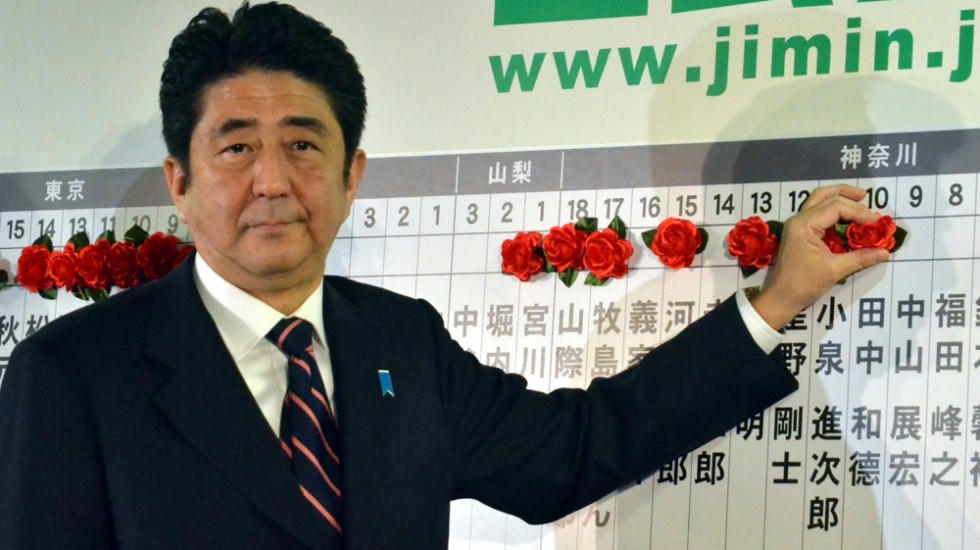I have quite an obssession with Japan, spanning through over half of my life. Obssession swinging from delight to absolute hatred. Last Sunday I spent 8 straight hours glued to the main page of Asahi.com following the voting. Although the results didn't surprise me, I had this eerie feeling of witnessing something weird, something dangerous and kind of mental.
Below is Reuters article on the latest election in Japan.
My note: Japan Restoration Party is a nationalistic party led by Hashimoto Toru and Ishihara Shintaro, both very... erhm, unique men. OK, let's call them lunatics.
Providing Korea will have Miss Park as the President, talks won't be nice and fluffy, me seems. Well, maybe less heated as with president Lee, but still.
Entering 2012, we were staring at a host of critical elections and
transitions in countries that represent about half the world’s gross
domestic product. You would think those elections and political
handovers would have been some of the most important events of 2012. Yet
they were largely red herrings.
In China, the consensus view is that even with a change of leadership, China is largely the same as it was;
if anything, the Chinese leadership has doubled down on the approaches
of its former government. In Russia, Vladimir Putin went from running
the country as prime minister to running the country as president. In
France, Nicolas Sarkozy was voted out and a socialist, François
Hollande, voted in, but that hasn’t changed France’s stance toward the
European Union, its most important relationship. And in the U.S., Barack
Obama swatted aside Mitt Romney while Congress remained divided, making
four more years of the status quo likely.
Yet in one major economy an election really did matter, and really
will change the way a country behaves in the global arena. That place
was … Japan.
At the beginning of the year, this notion seemed preposterous. Japan
has had 18 prime ministers in 23 years, a modern-day Asian record. How
important could a Japanese election be?
Yet the election that just saw Shinzo Abe return to the prime
minister’s office was a statement about the kind of country Japan wants
to be for the next few years. And it has major implications for the
U.S., China and others.
Abe’s party, the Liberal Democrats, defeated the ruling Democratic Party of Japan in a landslide,
capitalizing on several years of ineffective government by the DPJ. A
faltering economy, mismanagement of the nuclear aftermath of Japan’s
2011 tsunami and a growing national debt all doomed the DPJ. But the
election showed something else about Japan: It is increasingly
nationalistic.
Along with the Liberal Democrats’ victory, a new party, the Japan
Restoration Party, made significant headway, winning dozens of seats to
become the third-strongest bloc in Japan’s lower house. The Restoration
Party wants to remilitarize, rip up the U.S.-brokered Japanese
constitution and install a federalized system that would break Japan up
into self-governing regions. There’s a real nativist streak at work.
That sentiment helped Abe rise back to power. While not as stringent
as the Restorationists, he is a comparative hawk on China, talking about
“escaping the postwar regime” brokered by the U.S. and boosting defense
spending. In its economic policy, too, his government will be
meaningfully different from the Democratic Party’s, with a higher
inflation target and a preference in favor of stimulus. Japan, unlike
its peers in the rest of the world, has a definitively different
steward.
Nowhere will that matter more than in Japan’s relationship with
China. Like Japan, China is unhappy with the status quo. Recognizing
that the power dynamic between the two countries is no longer what it
was, China has been liberated from having to play nice. Over the past
year, China has increasingly laid claim to the Diaoyu/Senkaku Islands,
which Japan thinks belong to it. Just last week a Chinese fighter jet
went into Japanese airspace for the first time since 1958. Amid all
this, Japan’s response has been increasingly nationalistic, as best
evidenced byAbe’s re-election. After his party’s victory, Abe said, “The
Senkaku Islands are inherently Japanese territory.”
The next logical step for Japan is to engage with other countries
that are concerned about China’s rise. That, of course, means
strengthening ties with the United States just as much of the country
wants to move beyond the legacy of U.S. influence in the country. But
reducing its reliance on China could be wise in the long term for a
country trying to fend off a neighbor whose growth isn’t going to stall anytime soon.
What Japan wants to avoid is a situation similar to the one that played
out between Russia and Georgia in 2008. Japan has to resist China’s
provocations, or else risk getting drawn into a deadly confrontation
with a larger country that has something to prove. That would hurt the
Japanese economy far more than tacking away from China to strengthen its
relationship with alternatives like the U.S.
The last time Abe was elected prime minister, in 2006, his first foreign trip was to China. Don’t count on it this time around.
This essay is based on a transcribed interview with Bremmer.
Picture from: nipponnews.com
